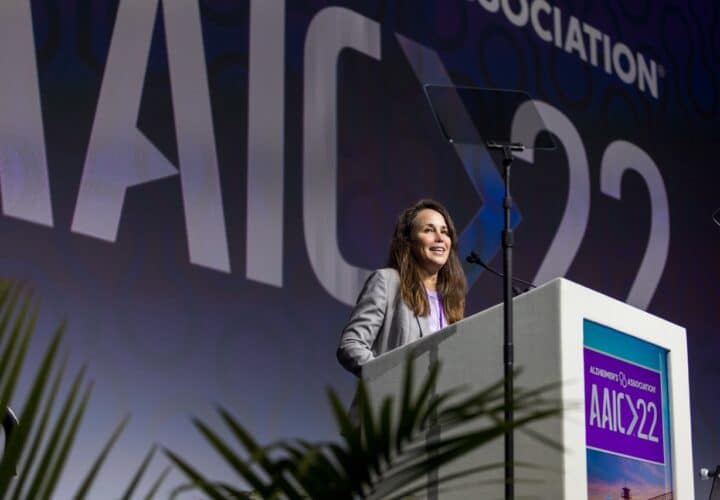An Offer He Couldn’t Refuse: Reporter Phil Gutis interviews Joanne Pike on her first day as CEO of the Alzheimer’s Association

As any reporter will tell you, the pitches from public relations folks can be ceaseless. But late last year, I received an offer I couldn’t refuse. It came from the Alzheimer’s Association, and it was an offer to do the first interview with Joanne Pike on the day that she became the association’s president and CEO.
The email explained that they thought it was appropriate to offer Pike’s first interview as CEO to a writer like me, who is living with Alzheimer’s. As they probably anticipated, I couldn’t agree more.
Pike, who holds a doctorate in public health leadership, has spent her entire career in health policy advocacy. She joined the Alzheimer’s Association in 2016, overseeing care and support services — outreach aimed at creating partnerships with health systems and physicians. She has also served as the association’s chief strategy officer. Pike takes over from Harry Johns, who served as the Association’s lead executive since 2005.
Pike assumes leadership of the association at what she terms a “pivotal moment for Alzheimer’s research, potential for new treatments, and what that means for how we provide care long term.”
She also assumes leadership at a time when the FDA is poised to approve lecanemab, the second-ever disease modifying drug for early Alzheimer’s. The agency is expected to make its decision on lecanemab as soon as this Friday, and the expected outcome is an approval. If this new, disease-modifying Alzheimer’s intervention is indeed approved, all eyes will then shift to the Centers for Medicare and Medicaid, which last year blocked widespread coverage of aducanumab (brand name Aduhelm).
“What CMS did was an unprecedented step in terms of blocking an entire class of treatments for those living with early stage Alzheimer’s,” Pike said, adding that CMS’s decision “did not provide access to treatment the same way that others with other diseases have access to first-line therapies.”
Late last year, the Alzheimer’s Association filed a formal request with CMS that it reconsider its blanket decision to require further evidence before approving any of the drugs like lecanemab for coverage by Medicare.
“The current CMS policy to severely limit access to these treatments eliminates people’s options, is resulting in continued irreversible disease progression, and contributes to greater health inequities,” Pike said in a news release at the time. “That’s not acceptable.”
In the interview, Pike declined to speculate why CMS continues to discriminate – my word, not hers – against people living with Alzheimer’s. And she emphasized that the community always knew that the first FDA-approved treatment for Alzheimer’s was not going to be a cure.
“But what we do believe is that individuals should have the right to have an informed decision with their healthcare provider about benefits and risks, and make those choices together for themselves,” Pike said. “And so, any barrier — whether that’s cost or coverage, logistics, or knowledge in the healthcare system — is unacceptable, especially when it’s an FDA-approved treatment.”
Pike responded to critics who thought it was inappropriate for the association to push so hard for approval of aducanumab.
“Our decision then and now and into the future,” she said, “is based on one thing and one thing only, and that’s the science.”
As a patient-advocacy organization, Pike said the association sees its role as advocating for and funding research that will lead to innovation in treatment and diagnostics.
“The first approved treatment leads to the second and the third, and only gets better over time,” she said. “And so while certainly we were willing to advocate on behalf of science, that advocacy was for individuals who could benefit as well.”
The association continues to believe that discovering a “silver bullet” cure for Alzheimer’s disease is unlikely. Therefore, it will continue to fund and advocate for research into myriad potential paths of treating neurocognitive diseases.
Until scientists discover those cures, Pike said it is critical that people diagnosed in the earliest stages of the disease speak out for those who can no longer advocate for themselves.
Speaking out, she said, will help reduce the stigma that continues to plague people living with Alzheimer’s and other cognitive diseases.
By offering me the first interview and helping me amplify my voice (and hers), Pike certainly seems willing to help those of us living with the disease to use our voices. Let’s hope that the rest of the Association, all of its regional and chapter directors, will follow her leadership.
Phil Gutis is a former New York Times reporter and current Being Patient contributor who was diagnosed with early onset Alzheimer’s. This article is part of his Phil’s Journal series, chronicling his experience living with Alzheimer’s and his participation in the aducanumab clinical trial.


